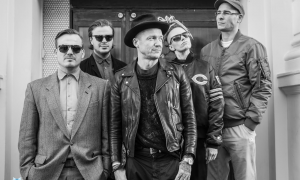Home » Jazz Articles » Live Review » Ben Wendel Group At Bop Stop
Ben Wendel Group At Bop Stop

Courtesy John Chacona
Bop Stop
Cleveland, OH
March 22, 2023
For a long time, California has held a mythic place in the U.S. popular imagination as a fountainhead of new ideas in culture, technology, or in the case of the smartphone ("Designed by Apple in California") of both. So it makes a certain amount of sense that every musician in the Ben Wendel quartet that played Cleveland's Bop Stop was either born in the state (pianist Taylor Eigsti and drummer Nate Wood, grew up there (Wendel, who was born in Vancouver) or attended college there (Eigsti, Wood and Chicago-born bassist Harish Raghavan).
Tenor saxophone, piano, bass and drums is, of course, a classic jazz combo formation, and with the exception of Wendel's pedalboard, the band used no electronics. But jazz was only one element in the mix.
Like the music of Kneebody, the Los Angeles cooperative that Wendel and Wood helped to found at the turn of the century, the music heard at Bop Stop stood at the center of a Venn diagram that includes jazz, but also praise music, rock, post-rock, hip-hop and contemporary classical music.
From praise music the quartet borrowed the device of the long, steady buildup of tension that releases into a quiet denouement that built to a second climax, usually over a vamp. This was the dramatic arc, established with "February" and "January"—two songs from Wendel's "The Seasons" project—and liberally used later in the band's 70-minute set. Rock songs also do this, and along with the sound mix, which could be blunt and two-dimensional at times, created the effect of arena-rock scale adrenaline in a jazz room.
Eigsti's piano was relatively low in that mix. Is that why he frequently threw in impishly spare single-note lines? Maybe not. The band's spirits were high all evening long. Wendel, who often bounced on his feet and swayed to the insatiable beat, thanked the crowd for bringing "Saturday night energy to a Wednesday night."
That energy was undeniable, but it was just a reflection of the relentless churn onstage. With few exceptions, the material chugged along with a locomotive momentum, Raghavan and Wood pushing things forward. Wendel responded by firing off bursts of hyper-articulate lines with the velocity and accuracy of algorithmic stock-trading software, a Johnny Griffin for the supercomputer era.
Even on "Song Song," Wendel's hommage to Ahmad Jamal's "Poinciana," the band dialed up the iconic Vernel Fournier beat to build a majestic climax, like a volcanic mountain rising out of the ocean. The effect wasn't lost on the audience of more than 70 (a solid turnout for a weeknight) as they rose to demand an encore.
After returning to the stage, Wendel announced that the band would do something out of the ordinary. "We're going to play on 'Rhythm' changes. I think the tune might be 'Wee,' but Harish would know. He knows all the tunes."
It was indeed the Denzil Best bop calypso, also known as "Allen's Alley," and it was kicked off at a breathless tempo of around 165 bpm, which is very close to the drag-race pace Griffin set on The Man I Love (Polydor, 1969). After a hard-charging tenor solo, Eigsti responded with a droll chorus that started with across-the-bar whole notes that led to trades between Wendel and Wood, thus invoking the spirit of the jazz tradition even as the particulars of that tradition were playfully manipulated.
As the band filed offstage, a concertgoer in his sixties said, "There wasn't a single point in that set where they swung," before hastily adding, "I know that wasn't the point, but . . ."
No, it wasn't the point, but Wendel and the band made a point, and they made it loud and clear.
Tags
Live Review
Ben Wendel
John Chacona
Lydia Liebman Promotions
United States
Ohio
Cleveland
Bop Stop
Taylor Eigsti
Nate Wood
Vancouver
Chicago
Harish Raghavan
Kneebody
Los Angeles
Johnny Griffin
Ahmad Jamal
Vernell Fournier
Denzil Best
PREVIOUS / NEXT
Ben Wendel Concerts
Support All About Jazz
 All About Jazz has been a pillar of jazz since 1995, championing it as an art form and, more importantly, supporting the musicians who make it. Our enduring commitment has made "AAJ" one of the most culturally important websites of its kind, read by hundreds of thousands of fans, musicians and industry figures every month.
All About Jazz has been a pillar of jazz since 1995, championing it as an art form and, more importantly, supporting the musicians who make it. Our enduring commitment has made "AAJ" one of the most culturally important websites of its kind, read by hundreds of thousands of fans, musicians and industry figures every month.

























